
The Aizoaceae, or fig-marigold family, is a large family of dicotyledonous flowering plants containing 135 genera and about 1800 species. They are commonly known as ice plants or carpet weeds. They are often called vygies in South Africa and New Zealand. Highly succulent species that resemble stones are sometimes called mesembs.

Lithops is a genus of succulent plants in the ice plant family, Aizoaceae. Members of the genus are native to southern Africa. The name is derived from the Ancient Greek words λίθος 'stone' and ὄψ 'face', referring to the stone-like appearance of the plants. They avoid being eaten by blending in with surrounding rocks and are often known as pebble plants or living stones. Lithops is both the genus name and the common name. The formation of the name from the Ancient Greek -ops means that even a single plant is called a Lithops.
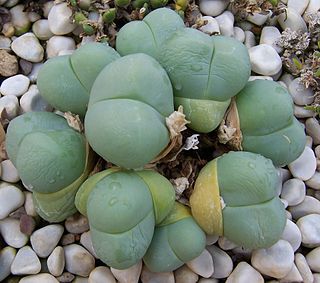
Gibbaeum is a genus of about 21 species of small succulent plants of the family Aizoaceae, indigenous to the Little Karoo region of South Africa. The name "Gibbaeum" comes from the Latin gibbosus (hunchback)
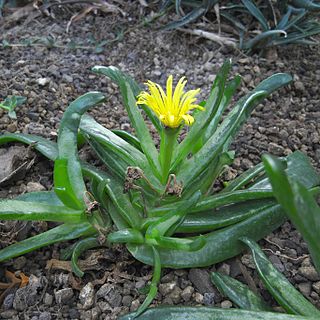
Glottiphyllum is a genus of about 57 species of succulent subtropical plants of the family Aizoaceae. It is closely related to the Gibbaeum and Faucaria genera. The name comes from ancient Greek γλωττίς glottis "tongue" and φύλλον phyllon "leaf". The species are native to South Africa, specifically to Cape Province and the Karoo desert. They grow in rocks and soils incorporating slate, sandstone and quartz. Rainfall in their native areas is between 125 and 500 mm, most of which falls in March and November.

Argyroderma is a genus consisting of a dozen species of succulents in the iceplant family from South Africa.

Glottiphyllum longum is a species of succulent plant in the family Aizoaceae, native to the Western Cape and Eastern Cape Provinces, South Africa.

Lithops viridis is a species of plant in the family Aizoaceae.

Haworthia mucronata is a species of the genus Haworthia in the family Asphodelaceae, endemic to the Little Karoo region, in the Western Cape Province of South Africa.
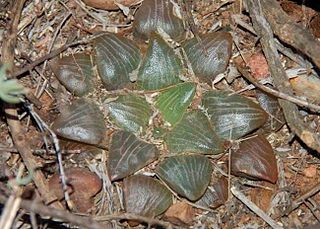
Haworthia bayeri is a species of the genus Haworthia in the family Asphodelaceae, endemic to the southern Cape Provinces in South Africa.
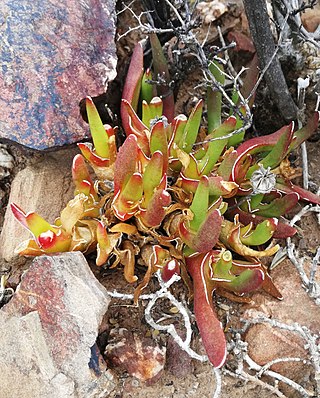
Glottiphyllum peersii is a rare species of succulent plant, in the family Aizoaceae. It is indigenous to arid areas near Klaarstroom in the Western Cape, South Africa.
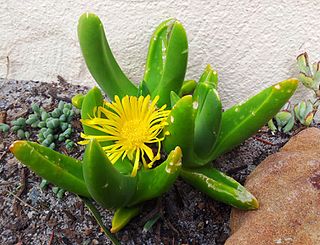
Glottiphyllum regium is a rare species of succulent plant, in the family Aizoaceae. It is known locally as "koeispene". It is restricted to a small arid area near Calitzdorp in the Western Cape, South Africa.

Glottiphyllum depressum is a common species of succulent plant, of the family Aizoaceae, native to South Africa.
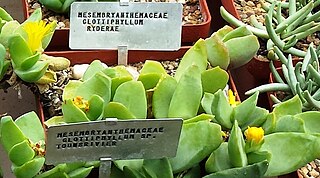
Glottiphyllum linguiforme is a widespread species of succulent plant, of the family Aizoaceae, native to South Africa. It is the type species of the genus Glottiphyllum.

Glottiphyllum surrectum is a species of succulent plant, in the family Aizoaceae. It is indigenous to arid areas of the Little Karoo, in the Western Cape, South Africa.
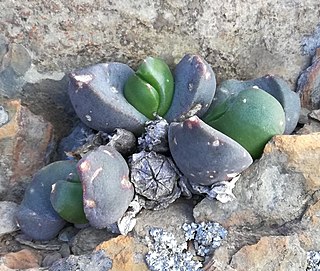
Glottiphyllum suave is a species of succulent plant, in the family Aizoaceae. It is indigenous to arid areas of the western Little Karoo, in the Western Cape, South Africa.

Glottiphyllum oligocarpum is a species of succulent plant, in the family Aizoaceae. It is indigenous to arid areas of the Little Karoo, in the Western Cape, South Africa.

Glottiphyllum fergusoniae is a species of succulent plant, of the family Aizoaceae. It is indigenous to the western part of the Little Karoo, in the Western Cape, South Africa.

Glottiphyllum nelii is a species of succulent plant, in the family Aizoaceae. It is indigenous to the arid Great Karoo region, South Africa.
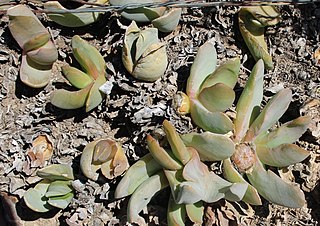
Glottiphyllum carnosum is a rare species of succulent plant, of the family Aizoaceae. It is indigenous to arid areas between the towns of Calitzdorp and Oudtshoorn in the Western Cape, South Africa. It co-occurs with several other species of Glottiphyllum.
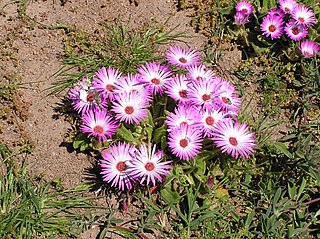
Dorotheantheae is a small tribe of annual succulents in the Aizoaceae subfamily Ruschioideae. Though it originally comprised three genera, Cleretum remains as the only recognised genus. Dorotheantheae are endemic to the western and south-western parts of South Africa. The type genus is Dorotheanthus, despite it being no longer recognised.





















